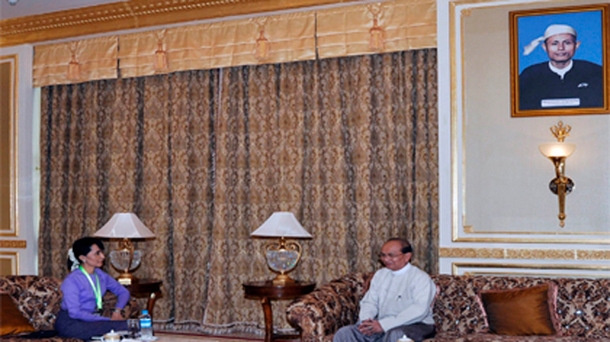Burma’s opposition leader Aung San Suu Kyi held her first talks with the country’s president Sunday since becoming a member of parliament.
She and President Thein Sein discussed a wide range of issues but details of the two-hour meeting were confidential, said Col. Zaw Htay, director of the president’s office. The talks took place in the capital, Naypyidaw, where parliament is currently in session.
Also present at the meeting were senior Cabinet ministers Aung Min and Soe Thane, who head the government’s peace committee that has brokered several cease-fires with ethnic groups. The pacts are seen as major steps toward ending long-running insurgencies.
Nyan Win, spokesman for Suu Kyi’s opposition party, called Sunday’s meeting “most welcome” but said he had no immediate details.
Thein Sein and Suu Kyi are key players in Burma’s political transformation after a half-century of military rule. They have met on two previous occasions, most recently in April. That meeting followed by-elections won by Suu Kyi’s party but preceded her entry to parliament.
Suu Kyi, a Nobel Peace Prize laureate, now heads the main opposition group with 43 seats in parliament, which is overwhelmingly dominated by allies of the former military regime. Last week, she was named head of a 15-member parliamentary committee that is tasked with the challenge of helping to implement rule of law in the country.
Suu Kyi has long struggled for democratic rule and spent about 15 years under house arrest during the former military regime. Her party boycotted a November 2010 general election, saying it was unfair and undemocratic.
But when Thein Sein, a former general and prime minister, became president last year, he introduced reforms that eased the political landscape after almost five decades of military repression.
The international community has praised the reforms, but human rights groups say the government and army continue to commit human rights abuses in isolated areas away from international view.
Suu Kyi’s party platform included three main objectives: to seek an end to ethnic conflicts, to try to achieve peace and rule of law and to amend the country’s constitution.
















